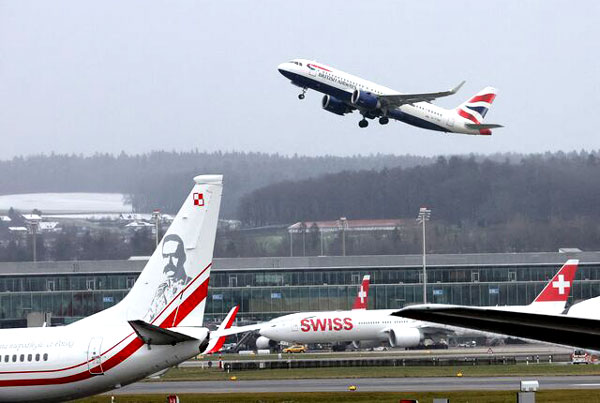Top European airlines, including Lufthansa, KLM, and Swiss International Air Lines, have announced the extension of flight suspensions to the Middle East due to intensifying regional tensions.
These decisions follow Israel’s strikes on Beirut and warnings from a senior White House official that Iran is preparing a missile attack against Israel.
The group, which includes Austrian Airlines, Brussels Airlines, and Swiss International, has been modifying its flight operations over the past months to address the unpredictable security situation.
Dutch airline KLM has extended its suspension of flights to Tel Aviv until the end of 2024. This follows its earlier announcement in August 2024 that flights would be halted until October 26 due to the volatile situation.
KLM spokesperson Elvira van der Vis confirmed the extension, citing ongoing concerns in the region.
Israel's neighbours closed airspace and airline crews skirted an escalating conflict, with many seeking diversions, after Iran fired a salvo of ballistic missiles at Israel on Tuesday, reported Reuters.
A spokesperson for tracking service FlightRadar24 said flights diverted "anywhere they could", and a snapshot of regional traffic showed flights spreading in wide arcs to the north and south, with many converging on Cairo and Istanbul.
FlightRadar24 said Istanbul and Antalya in southern Turkey were becoming congested, forcing some airlines to divert south.
On Tuesday, about 80 flights, operated by the likes of Emirates, British Airways, Lufthansa and Qatar Airways bound for major Middle East hubs such as Dubai, Doha and Abu Dhabi, were diverted to places such as Cairo and European cities, its data showed.
Many airlines have also suspended flights to the region or are avoiding use of affected air space.
Iran launched the strikes in retaliation for Israel's campaign against Tehran's Hezbollah allies in Lebanon, and Israel vowed a "painful response" against its enemy.
Earlier, Eurocontrol, a pan-European air traffic control agency, had warned pilots of the escalating conflict.
"A major missile attack has been launched against Israel in the last few minutes," it said in an urgent navigation bulletin. "At present the entire country is under a missile warning."
Shortly afterwards it announced the closure of Jordanian and Iraqi airspace, as well as the closure of a key crossing point into airspace controlled by Cyprus.
An Iraqi pilot bulletin said its Baghdad-controlled airspace was closed until further notice, due to security concerns.
Iraq's transport ministry later re-opened its airspace to civilian flights using its airports. On X, FlightRadar24 said, "It will be a while before flights are active there again."
Jordan also re-opened its airspace after a closure following the volley of Iranian missiles towards Israel, the Jordanian state news agency said.
Lebanon's airspace will be closed to air traffic for a two-hour period on Tuesday, Transport Minister Ali Hamie said on X.
The latest disruptions are expected to deal a further blow to an industry already face curbs due to conflicts between Israel and Hamas, and Russia and Ukraine.
Airlines across the Middle East are facing significant disruptions following the closure of key airspaces in response to escalating regional tensions.
These developments have severely impacted the operations of major carriers like Emirates, Etihad Airways and Qatar Airways, said media reports.
Emirates announced the suspension of its services to Iraq, Iran, Jordan and Beirut, and is rerouting flights to avoid the affected airspaces. The airline stated that it is closely monitoring the situation and is prioritising passenger safety.
Similarly, Etihad Airways is anticipating delays and potential cancellations over the coming days as it adapts to the new flight paths required due to the closures.
European carriers, including Lufthansa and KLM, have also suspended flights to the region. The disruption is causing a ripple effect across international air traffic, leading to increased flight times, higher fuel consumption and logistical challenges for airlines as they navigate these sudden changes.
The situation is expected to lead to widespread delays and operational inefficiencies, especially for carriers with extensive networks in the region. As airlines reconfigure their routes to avoid closed airspaces, passengers are advised to check with their respective carriers for updates on flight status and potential delays.
German carrier Lufthansa also announced the suspension of its flights to Beirut through November 30, 2024. Additionally, the airline group confirmed that flights to Tel Aviv are canceled until October 31, while flights to Tehran will remain suspended until October 14.
In a further move, the airline group said it would avoid Iranian, Iraqi, and Jordanian airspace until October 2 and continue to avoid Israeli airspace until the end of October.
A Lufthansa spokesperson expressed regret for the inconvenience caused to passengers, while stressing that the safety of both passengers and crew remains the airline's top priority.
Swiss International Air Lines, a subsidiary of the Lufthansa group, echoed the decision, saying the extended suspensions aim to provide predictability for travelers and crew amid the uncertainties of the escalating conflict.
The flight suspensions follow recent military escalations in the Middle East, including Israel’s ground offensive in Lebanon and a week of intense air strikes that have claimed hundreds of lives. The conflict deepened on Tuesday, as Israeli forces engaged in clashes on the ground in Lebanon.































